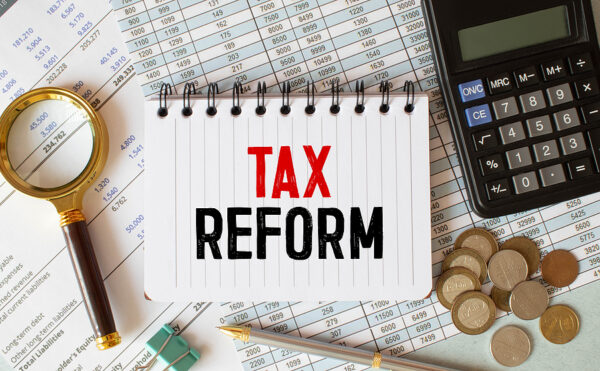Employers and employees alike are still trying to figure out how the recent tax reform will affect their income levels. While many workers may see a decrease in their tax rate when they file, there are other caveats and benefits that might cancel out the decrease. The same applies to businesses. The benefits of a tax cut might get lost in other non-deductible expenses. Things are still fluid and local as well because a local tax reform group polls says that taxpayers are still looking for additional relief and reform. Tax reform that encourages saving tends to:
a. shift the tax burden toward high-income people away from low-income people.
b. shift the tax burden toward low-income people away from high-income people.
c. reduce the rate of growth of output.
d. reduce the deficit

There’s a lot of information (and misinformation) out there on what tax reform that encourages saving tends to mean for businesses, so let’s cut through the noise and provide five clear, accurate insights on what you can expect this upcoming tax season.
Companies Will Likely Notice Tax Breaks After Tax Reform
One of the main trends that most experts can agree on is that companies are paying lower taxes as a result of the Tax Cuts and Jobs Act (TCJA) passed. (We try and stay away from anything that says “small business” or Sole Proprietorships, etc. as it is implies we focus on small business)
“The new reform is organized to reward your business if you have a lot of employees and it incentivizes other companies to go out and hire new employees,” Bryce Welker, The CPA Exam Guy.
Many companies responded positively to the tax breaks, with corporations from American Airlines to Walmart giving tax reform bonuses to employees. Similarly, America is approaching full employment as more companies create jobs and continue to expand.
That being said, not all companies and industries are created equal. You may find that your business is exempt from these breaks or your company size prevents you from receiving the refund you expect.
Employees Will Likely Notice Larger Paychecks
Along with companies receiving tax breaks from the TCJA, employees as a whole are more likely to see larger paychecks because of the tax plan. While there are still seven tax brackets, the percent owed in each bracket is less than before. This means that most employees should see an increase of a few dollars to a few hundred dollars depending on their current income and tax level.
Download our HR Outsourcing Guide >>
Employees Can’t Deduct Unreimbursed Expenses
In the past law, employees who incurred expenses on the job but weren’t reimbursed for the costs could deduct the expense, but not anymore. For example, employees paying for the cost of uniforms, using their personal car for work purposes (outside of commuting), upgrading a home computer that they work on, and paying dues to unions or professional organizations can no longer deduct these expenses.
It is in an employee’s best interest to file for reimbursement (meaning companies may see an increase in reimbursement requests) if they want compensation for their costs. A lack of reimbursed expenses can cut in to the benefits offered from a lower tax rate.
Employers Can’t Deduct Employee Commute Stipends
Similarly, in the old tax law, companies were able to offer stipends to employees that commute to work as a hiring incentive. These included compensating employees who bike to work, offering corporate transit cards for trains and buses, and reimbursing parking expenses. Under the new law, these stipends are no longer tax-deductible for employers.
Companies may be less likely to offer transportation coverage as a service if they have to pay taxes on it, but most experts believe businesses are unlikely to stop incentive programs immediately because of the lack of tax break.
Tax reform That Encourages Saving Tends To be a Mixed Bag
Along with the cost of transportation expenses, there are other regulations for what employers can deduct. Office snacks and meals used to be 100 percent deductible, but are now only 50 percent deductible. However, the expenses for company-wide parties are still 100 percent deductible. Expenses spent on clients (like entertainment, golf outings, and concerts) are not deductible, a drop from their 50 percent deductible rate last year.
What a business can and can’t deduct is more nuanced now, meaning your company will benefit from working with accountants who understand tax law so your can maximize benefits.
The Tax Cuts and Jobs Act (TCJA) has ups and downs for both employers and employees. With fewer deductibles, employers are less likely to offer benefits to employees. Fewer benefits mean employees pay more, eating into their savings from the tax break. Ultimately, it depends on the employer what they do with their savings and whether or not they pass the added income on to their staff.
Learn how you can manage your benefits and care for your employees with Corban OneSource, your seamless HR solution, and never feel caught off guard by tax policy ever again. We specialize in companies with 75 to 6,000 employees.


